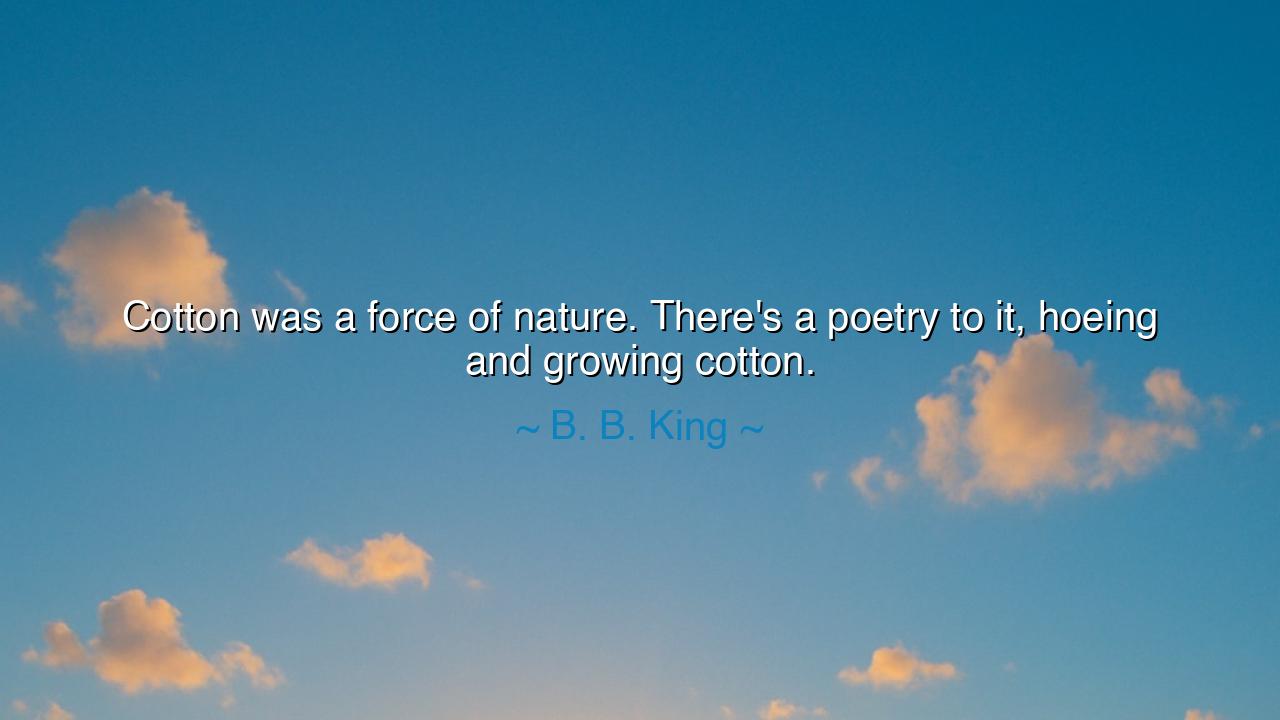
Cotton was a force of nature. There's a poetry to it, hoeing and






The bluesman B. B. King, son of the Mississippi Delta, once spoke with the weight of memory and the rhythm of history: “Cotton was a force of nature. There’s a poetry to it, hoeing and growing cotton.” In these few words, he touched not only the story of his own youth but also the deep currents of toil, suffering, resilience, and art that shaped generations of his people. For cotton was more than a crop; it was an element of life, a power that dictated the fates of millions, binding them to the soil, bending their backs, yet also forging their songs and spirits.
To call cotton a force of nature is to say that it ruled like the wind or the river—vast, unyielding, and inescapable. In the American South, it was cotton that determined wealth and poverty, freedom and bondage, despair and survival. The plantation fields stretched like seas, and in them men, women, and children bent with hoes beneath the sun. It was a rhythm of endless repetition—seed to plant, plant to boll, boll to burden. Yet within this monotony, King found poetry: a rhythm of life that carried pain but also endurance, sorrow but also song.
The poetry of hoeing and growing cotton was not written in books, but in the human body itself. Each swing of the hoe, each step through dust and thorn, became a verse in the living hymn of survival. Out of that labor rose the blues, born of sweat, of longing, of endurance. When B. B. King bent his guitar strings to cry and moan, he was echoing the same rhythm he had once known in the fields, the cadence of men and women bound to the earth, yet still singing.
History confirms this truth. Generations of African Americans carried the weight of cotton on their shoulders. From the enslaved in the nineteenth century to the sharecroppers of the twentieth, the crop was both livelihood and chain. Yet it was in those same fields that the spirituals were sung, that the blues were born, that a culture of resilience was forged. Cotton crushed the body, yet it could not crush the soul. It became, paradoxically, both a symbol of oppression and the soil from which art and strength grew.
B. B. King’s words, then, are not simply nostalgia—they are recognition. He does not deny the hardship of cotton, nor the cruelty it represented, but he sees within it the poetry of human perseverance. The rows of white bolls were like verses in a tragic song, yet out of them came a music that would one day conquer the world. Cotton became not only the wealth of the South, but also the root of a sound—the blues—that gave voice to the voiceless and strength to the weary.
The lesson is profound: even from the harshest labor, beauty may arise. Even when life binds us to toil that seems endless, there is poetry in endurance and dignity in survival. What crushes us can also shape us, what bends us can also teach us rhythm, what burdens us can also awaken art. The cotton field, in its harshness, gave birth to the blues, just as trials in our own lives may give birth to wisdom, resilience, or creativity.
Practical action flows from this wisdom. Whatever the “cotton” of our own lives may be—whether hardship, struggle, or burden—let us not despise it alone, but search for the poetry within it. Turn labor into rhythm, pain into song, struggle into strength. Encourage one another to endure, but also to create, to lift beauty out of hardship. For if cotton, once the cruel master of so many, could give rise to the music of B. B. King, then our own struggles may yet give rise to greatness.
Thus, King’s words echo like the notes of his guitar—mournful yet majestic, humble yet heroic. Cotton was a force of nature, but so was the human spirit that labored beneath it. And the poetry of those fields lives on in every song of the blues, reminding us that beauty can rise from sorrow, and strength can be born from toil.






AAdministratorAdministrator
Welcome, honored guests. Please leave a comment, we will respond soon